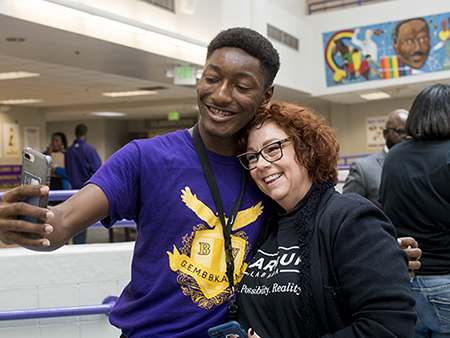 UAB’s GEAR UP program is one of many jewels within the School of Education, according to Dean Autumn Tooms Cyprès, Ed.D. School of Education faculty, staff and students travel to the Black Belt on Fridays in one of GEAR UP’s five Alabama regions to engage students in one-on-one mentoring.The commitment is clearly written in black and white. It is on a white board right next to the desk of Autumn Cyprès, Ed.D., dean of the University of Alabama at Birmingham School of Education.
UAB’s GEAR UP program is one of many jewels within the School of Education, according to Dean Autumn Tooms Cyprès, Ed.D. School of Education faculty, staff and students travel to the Black Belt on Fridays in one of GEAR UP’s five Alabama regions to engage students in one-on-one mentoring.The commitment is clearly written in black and white. It is on a white board right next to the desk of Autumn Cyprès, Ed.D., dean of the University of Alabama at Birmingham School of Education.
It is a commitment, she says, that is steadfast, “fearless” and necessary to bringing substantial, positive change to the educations of current and future Alabamians — and beyond.
“We are committed to developing and sharing knowledge to support education, health and wellness for professionals who serve diverse worlds in urban and rural contexts,” Cyprès said. “To do this, we are preparing teachers by transforming their understanding of their roles and the demands of the profession. Because what we know for certain is that you can’t really talk about a school’s role in education in society without thinking about the people you are teaching — what are their backgrounds, their own understandings of their purpose as servants to society? We are serving learners. And it goes beyond those who just aspire to be teachers. Our School of Education is at the intersection of health and wellness and learning, and being prepared to learn. Most schools of education don’t do that.”
This is the mission of UAB’s School of Education, with a faculty and staff committed to building the future of education through new ideas and initiatives in the classroom. The work comes in its counseling clinic, in teaching English language learners, in research, and in shaping the next generation of leaders in our community, the state and beyond. It is Forging the Future in a variety of areas, all with the aim of contributing to the public good.
“I am so proud of our faculty and staff because we have been fearless when having the really hard conversations about what our work really means, and how we are serving learners,” said Cyprès, who is also a member of the Board of Trustees of the McWane Science Center. “And it’s more than just people who aspire to be teachers. How do we understand what it means to be an exercise physiologist? And what does that have to do with obesity rates in Alabama? The opioid crisis fuels the death rates among mothers in our state, which is one of the highest in the nation. That means we struggle with one of the highest rates of children who are orphaned or left with a single parent.
“All of that goes back to how we are serving families and learners. We are constantly evaluating and monitoring how and where we can make a positive impact. Fortunately, we are just the school and university to do it, and do it successfully.”
|
Our School of Education is at the intersection of health and wellness and learning, and being prepared to learn. Most schools of education don’t do that.” |
In truth, no other school of education in the state, or the Southeast, has the ability to address the global and local challenges in education, health and wellness at the same level as UAB’s, according to Provost Pam Benoit.
The values of the school — integrity, respect, diversity and inclusiveness, collaboration, excellence and achievement, stewardship, and accountability — are lived every day through the Community Counseling Clinic, the English as a Second Language program, the Department of Human Studies, and the Department of Curriculum and Instruction. And the programs that support the school’s research and scholarship, engagement, growth, and culture are among the strongest in the Southeast.
“Our School of Education is already recognized for programming and teaching that is of the highest quality and responsive to 21st century learners,” Benoit said. “Our faculty deliver modern and accessible models of preparation of professionals that reflect cutting-edge research and best practices. The school has recently retooled its curriculum and student experiences to better reflect learning opportunities within the context of the society where they will serve, and the school has done this as a central part of its mission. This is a critical component in the school’s mission because it answers a perilous need in our state and beyond — to meet our underserved areas where they are and teach them within the context of their own circumstances. It’s an admirable and necessary mission for our school.”
The foundation for success is in place.
The school was recently ranked the No. 1 School of Education in Alabama by U.S. News & World Report and jumped 27 spots in the national rankings to No. 85. The school aims to continue to increase its quality and impact of research and scholarship, grant submissions and acquisitions, and interdisciplinary research and scholarship collaborations. It also intends to build upon and enhance its community work through the Community Counseling Clinic and its benchmark English as a Second Language program — among others.
And, of course, there is training the next generation of leaders in education. There is much more to it, Cyprès says, than knowledge of reading, writing and arithmetic.
“There is this societal assumption in some areas that teaching is a fall-back career, and that could not be further from the truth,” Cyprès said. “Teaching is like other professions that are a service to our country and our society, like the military, police or medical profession. In our school, we are preparing teachers by transforming the understanding of their role and the demands of the profession.”
Here is a look at several elements of UAB’s School of Education and the impact they are having across the university’s mission.
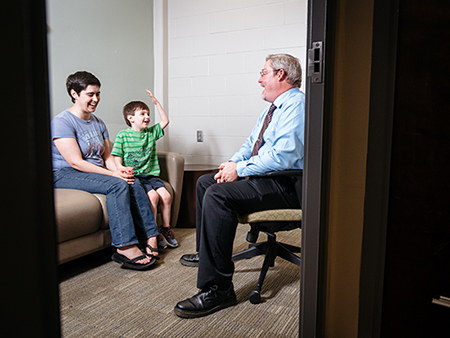 The SOE’s Community Counseling Clinic provides an environment where student-clinicians train and gain practical experience to expand their skills as counselors, said Sean Hall, Ph.D. (right), clinic director and faculty supervisor. “Many of these graduates go on to sustain and advance the counseling profession in Alabama and the Southeast.The Community Counseling Clinic
The SOE’s Community Counseling Clinic provides an environment where student-clinicians train and gain practical experience to expand their skills as counselors, said Sean Hall, Ph.D. (right), clinic director and faculty supervisor. “Many of these graduates go on to sustain and advance the counseling profession in Alabama and the Southeast.The Community Counseling Clinic
In Alabama, the need for mental health services is high. However, access to mental health providers can be difficult.
The School of Education founded its Community Counseling Clinic in 2011 to provide an opportunity for uninsured or underinsured community members to access low-cost counseling services they would not otherwise have access to. The clinic even recently added a play therapy room in order to extend services to children as young as 3 years old.
Fees are determined by income and family size and range from $5 per individual session to no more than $30 per session.
“All of the faculty here entered into this profession with a strong desire toward helping others work through mental health academic, career and relationship challenges,” said Sean Hall, Ph.D., assistant professor of human studies, and director of the Community Counseling Clinic.
“This clinic engages in powerful, necessary work, and it has been doing so for years,” Cyprès added. “Now we are building more partnerships with other schools and are in the beginnings of piloting two programs in two school districts to talk to teachers and give some interventions where it is needed.”
Optimizing and expanding services by increasing its visibility in the community is a focus of the clinic. Hall says they also want to foster an innovative learning environment by using contemporary, evidence-based treatments and data to enhance student learning and client outcomes. It also aims to engage students in clinical research opportunities.
“The clinic provides an environment where student-clinicians train and gain practical experience. They do this under close supervision from faculty and build and expand their skills as counselors,” Hall said. “Many of our alumni venture into our communities to build private practices and become leaders in the nonprofit and social services space. And many of these graduates go on to sustain and advance the counseling profession in Alabama and the Southeast.”
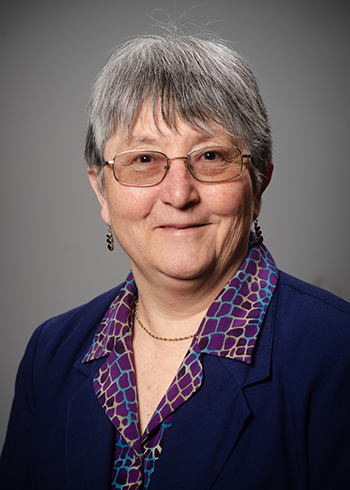 Susan Spezzini, Ph.D., program director of Secondary Education and ESLESL Teacher Education Program
Susan Spezzini, Ph.D., program director of Secondary Education and ESLESL Teacher Education Program
The School of Education’s English as a Second Language Teacher Education Program celebrated its 20th year April 30. The first graduate course was taught by Julia Austin, Ph.D., in 1999, and since its inception, the program’s guiding force has been responding to the needs of language learners, communities and schools.
“The passion and dedication of graduate students and alumni for teaching English learners (ELs) has been strong for two decades now,” said Susan Spezzini, Ph.D., professor of English learner education and program director of Secondary Education and ESL. “We now offer a master’s degree with three concentrations, an educational specialist degree with two concentrations, three levels of state-issued teacher certification, and a new graduate certificate called “Micro-Credential in Teaching Multilingual Learners.”
Many in the school credit Austin for the foresight to create the program and guide it to a level of prominence greater than any other ESL program in Alabama. The school recognized Austin’s work at this year’s celebration of the program with the announcement of the Dr. Julia S. Austin Endowed Scholarship.
When the ESL program reached its first full cycle in 2001, the first three UAB students obtained ESL teacher certification from the Alabama State Department of Education. Shortly thereafter, an unprecedented surge of English language learners in the public schools was mirrored by a corresponding surge of graduate students in ESL teacher education.
Untrained in the teaching of linguistically diverse students, teachers at all grade levels were eager to learn how to incorporate ESL best practices into their content classes for more effectively supporting ELs’ linguistic and academic development. As of summer 2019, 746 UAB students have earned ESL certification and/or a graduate degree for teaching ESL. Currently averaging 65 graduates a year, UAB leads the state in the preparation of ESL-certified teachers.
ESL teacher candidates learn to teach effectively through a series of clinical experiences, which have taken place in 33 school districts and 29 adult learner settings, including the INTO UAB English Language Programs. For many graduate students, their first clinical experience is teaching ESL in the SOE’s Community English classes, which are offered free of charge to adult language learners. By connecting theory to practice and also by providing both foundational and signature courses, UAB’s ESL teacher education program has built a strong reputation.
“This program produces more English as a second language teachers than any other school in our state,” Cyprès said. “It is a benchmark for Alabama and one of the finest programs in the country, and that’s due in large part to the work of Dr. Austin and Dr. Spezzini, who are both legends in the field. They have made this program a true community program.”
Indeed, each of the program’s alumni teaches approximately 30 ESL learners per year. When multiplied together, the 746 alumni have taught ESL to 21,000 learners during the current year (2018-19).
Another cornerstone of the program has been 10 professional development grants, totaling $15 million, from the U.S. Department of Education. The first federal grant in 2002 was instrumental in establishing distance course delivery through site-based professional learning communities. Virtual components were added systematically to this distance delivery format, and as of next year, most courses will be available fully online.
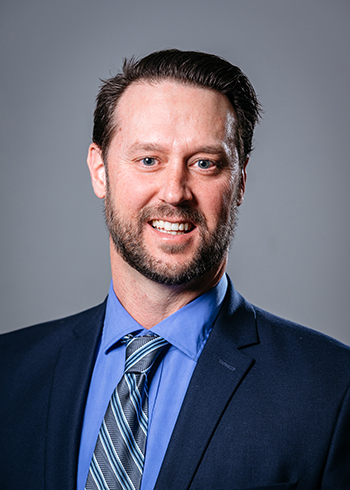 Eric Plaisance, chair of the Department of Human StudiesResearch and scholarship
Eric Plaisance, chair of the Department of Human StudiesResearch and scholarship
The School of Education recently adopted a new strategic plan with five priorities – Programs, Research and Scholarship, Engagement, Growth, and Culture.
The school is conducting an extensive examination of each program to co-construct transformative curricula with its community of shareholders.
“Engaging in this will best inform our research and scholarship needs to leverage a modern understanding of needs in an evolving workforce,” said Eric Plaisance, chair of the Department of Human Studies.
In alignment with the school’s new strategic plan, School of Education faculty are heavily engaged in producing innovative ideas and questions Plaisance says will lead to high-impact research publications that will increase the submission and acquisition of grants and contracts to fund their scholarship and research.
“We have also made a commitment to nurture interdisciplinary collaboration with other units on campus and our partners in the community and throughout the world,” he said. “Our focus on developing the highest-quality programs will prepare students for the opportunities and challenges they will face as leaders in their practice.”
Research and scholarship are the top priorities for the department, and a thorough review of how to increase research efforts has already taken place. Plaisance has examined the multiple approaches the faculty employ to address research and scholarship questions and the barriers that limit the production of successful publications and grant and contract submissions.
Financial commitments have been made schoolwide to support faculty presentations at international meetings and submission of manuscripts in national and international journals in an effort to continue to raise the profile of the school.
At the department level, Plaisance actively works with faculty to assemble multidisciplinary advisers and writing teams to improve the quality and efficiency of its manuscript and grant submission cycles.
“Further proof of the commitment to increase the research profile of the department is development of a schoolwide Office of Research, Grants and Faculty Development,” Plaisance said. “The office will work closely with both departments within the School of Education to assist faculty in their development toward tenure and promotion, which is in line with our commitment to help faculty develop high-quality manuscripts and research proposals.”
Partnerships — both on campus and beyond — also are a focus in aiding both research and curriculum efforts. The school recently partnered with the Autonomous University of Baja California in Mexico to enable the university to study UAB’s research on health and wellness sciences with kinesiology.
“They are examining how we teach and how we deliver,” Cyprès said.
| “We are constantly evaluating and monitoring how and where we can make a positive impact. Fortunately, we are just the school and university to do it, and do it successfully.” - Autumn Cyprès, School of Education Dean |
“The core strength of human studies is our faculty’s commitment to their field, particularly as it relates to teaching,” Plaisance added. “Our faculty consistently receive high marks for teaching, and I am very proud of the work we do in the classroom to prepare students. Our commitment to developing new knowledge through scholarship and research is a crucial component to continuing that growth as professionals. Innovation and high-quality instruction in the higher-education classroom are strongly associated with professional advancement in the field — performing innovative studies as a collaboration between our faculty, undergraduate and graduate students cultivates our success and is a growing initiative that will enhance quality and growth.”
Building (more) partnerships
The partnerships do not stop with the University of Baja California. In fact, there are many more high-impact collaborations happening right here at home.
One that will be especially impactful is through UABTeach, a program designed to recruit and train a new teaching workforce of highly qualified instructors in science, technology, engineering and math. A partnership between the College of Arts and Sciences, the School of Education, the School of Health Professions, and the School of Engineering, UABTeach enables undergraduate students majoring in STEM fields to receive both their subject matter degree and full secondary teaching certification in four years at no extra time.
Since spring 2017, more than 23 new math and science educators have graduated from the School of Education as part of the UABTeach program. These graduates are teaching mostly grades 6-12 in courses including math, pre-algebra, algebra, life science, chemistry, AP Chemistry and AP biology. Among the school systems employing these graduates are Birmingham City, Jefferson County, Hoover City, Tuscaloosa County and Boaz City.
Preparing a new force of highly qualified science, technology, engineering and mathematics teachers to enter classrooms throughout the state of Alabama is an ambitious initiative. Christina Oates Turner never envisioned she would one day become a teacher — until someone recommended she seek a minor in UABTeach. After she taught her first lesson, and interacted with her first class as part of the program, she was hooked.
| “UAB Teach changed my life. It gave me purpose while in college.” - Christina Oates Turner, 2017 UAB Graduate |
Turner, a 2017 graduate of the program, is currently a seventh-grade math teacher at Jasper Junior High School in Walker County. Turner believes that UABTeach prepared her to become an effective teacher in ways that go beyond knowledge of subject matter.
“The essential thing I learned was the need to really connect with my students,” Turner said. “Then it was to create lessons that would engage them and deepen their understanding of the content — all while creating an accommodating atmosphere for everyone who entered my classroom.”
Turner says her first year at Jasper Junior High was a success. Students told her multiple times that she made math enjoyable for them, and that they felt they were actually good at math by the end of the year. They loved the struggle, she says, and the fact that she was there to push them around every corner.
“UABTeach changed my life,” Turner said. “It gave me purpose while in college. I am forever grateful for the friendships and opportunities UABTeach offered me.”
The fact that Turner initially had no thoughts of pursuing a profession in teaching is not lost on program recruiters.
“The brilliance of UABTeach is that we recruit students who may not have considered teaching as a career,” said Jennifer Ponder, Ph.D., chair of the Department of Curriculum and Instruction and co-director of the University STEM Education Center. “The program allows students to take advantage of a parallel career plan.”
Of course, there is also the curriculum and instruction element, which — as Cyprès points out — goes beyond just the knowledge of a particular field.
According to Ponder, it is imperative that teacher preparation programs build on key skills that students will need to successfully navigate life beyond K-12 education. They must also transform the understanding of their roles and the demands of the profession. “Our goal is to ensure that students have experiences that will require them to think critically, problem-solve, collaborate, and act conscientiously to address complex issues that affect their fields of study and their students’ lives and communities,” Ponder said.
To that end, the program has retooled its curriculum and the experiences for its students so they begin to think about what it means to be a learner — and a teacher — in any setting. Programmatic revisions center on how teachers engage learners whose world experiences are complex and beautiful yet vastly different from, perhaps, their own.
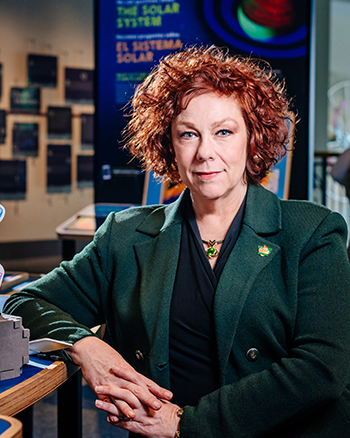 Autumn Cyprès, Ed.D., dean of the School of Education.One of the ways UAB immerses its students in these learning environments is through the Gaining Early Awareness and Readiness for Undergraduate Programs grant — a $60 million grant that was awarded to the university in 2014 by the U.S. Department of Education.
Autumn Cyprès, Ed.D., dean of the School of Education.One of the ways UAB immerses its students in these learning environments is through the Gaining Early Awareness and Readiness for Undergraduate Programs grant — a $60 million grant that was awarded to the university in 2014 by the U.S. Department of Education.
It is designed to increase the number of low-income students who are prepared to enter and succeed in postsecondary education. UAB services nearly 9,300 students in 42 schools across 21 school systems throughout the Black Belt as part of the grant.
“We go out in the field to meet these students, talk to them and find mentors for them to talk with them, and have them think about where they are going with their grades,” Cyprès said. “Then they come to our campus in the summer for a mini-camp. And last year, for the first time ever, we had students dual-enrolled in their high school and here, taking courses and earning college credit through a partnership with Enrollment Management and the College of Arts and Sciences.
“So our commitment to developing new knowledge through scholarship and research is as strong as it has ever been and growing. And it has to continue. We have to continue to push to find ways to serve learners and improve our education now and for generations to come.”
